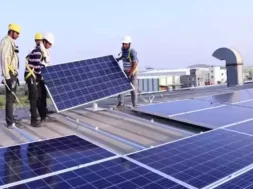
San Mateo County Readies $2,000 Grants for EV Charging Stations
Grants for EV charging stations for multi-resident buildings and workplaces will be available later this year in San Mateo County, CA, under a $16 million program — the largest in the state thus far — aimed at accelerating the adoption and use of EVs in the area.
The multi-housing portion of the program, aimed for a summer launch, will include low-income housing.
The county Community Choice Aggregator, or quasi-governmental green electricity supplier, Peninsula Clean Energy, is developing the program as a follow-up to a 2018 program for subsidized EV purchases by residents of the jurisdiction.
“We plan to move the needle on vehicle electrification in a serious way,” says Rafael Reyes, the Director of Energy Programs for PCE. “This program is four year, $16 million effort to deploy 3,600 charging stations across all market segments where they are most in need, including the workplace and multihousing,” he says. These equipment will include some commercially-located level 3 (fast speed) chargers, while apartment buildings and workplaces will be level 1 (slow speed) and 2 (moderate speed), he notes.
“We’re also looking forward to the potential for adding plans for fleets and ride-hailing services like Lyft and Uber as well,” says PCE CEO Jan Pepper.
“Some market research suggests that over 30% of the residents in the county would like their next vehicle to be an EV, so demand for the vehicles should increase if there is adequate access to charging,” Reyes says.
The program will seek to layer financial incentives from other jurisdictions, including the state, and from utilities to help increase the grant size. In general, each grant is expected to reduce the cost of a charging station by around $2,000. Among state institutions that may participate are the California Air Resources Board (CARB), the Volkswagen settlement fund, and the California Energy Commission.
The program is equipment and software agnostic, but it is likely that vendors will need to be on an approved list, like that of PG&E, says Reyes.
RFP for Program Management
To help streamline the process, PCE expects to issue an RfP (Request for Proposals) for a program management system that can incorporate various grant or incentive sources seamlessly, Reyes adds.
PCE is also in the process of procuring additional green electrical generation for future growth in the county, and some of this new solar, wind, or battery capacity may provide energy to the EV stations in the program. The PCE Board has set a target to develop 20 MW of new power projects in San Mateo County by 2025. PCE also has an ongoing net energy metering program.
The PCE EV program follows an earlier, albeit smaller EV program in Marin County. That program provided up to $2,000 per charger from the CCA and up to $2,300 from PG&E. Charging stations can be purchased for as less than $1,000, and software to manage a commercial charger can be leased for as little as $60 per month.
An ongoing predecessor program to the EV charging infrastructure program in San Mateo county is a $745,000, three year Ride & Drive Program that is aimed at introducing EVs to residents.
CARB Analysis
The CARB has long offered grants for the purchase of an EV, and in the case of a low-income candidate, the amount is as high $5,000 per vehicle. California’s Green Building Standards (CALGreen) Code requires new multifamily housing developments with 17 units or more to install EV charging infrastructure in at least 3 percent of total parking spaces.
California Air Resources Board (CARB) staff completed a technical and cost analysis of EV charging needs in the state in April 2018. The report indicates that a current 17 unit size threshold should be eliminated and a higher 10 percent requirement is needed beginning in 2020 to meet the projected demand for Level 2 charging stations between 2025 and 2030.
The bottom line of the CARB report is that there is “a gap of between 66,000 and 79,500 charging stations are still needed to meet the demand for charging stations in multifamily housing by 2025.”
Vendors of EV charging stations on PG&E’s approved list include:
- ABM
- Andromeda Power LLC
- BTCPower (Broadband Telcom Power, Inc.)
- ChargePoint
- Electric MotorWerks, Inc.
- EV Connect
- EVBox
- EVoCharge LLC
- EVSE LLC
- Greenlots
- Shell New Energies
- Tellus Power, Inc.
- Verdek
- Video Voice Data Communications
- ABM
- Kitu Systems
- Liberty Plug-Ins
- National Car Charging
- PowerFlex Systems
- SemaConnect, Inc.















